B Raman
What is objectionable is not what the government has conceded to Anna Hazare's demands, but the manner in which it has conceded it, writes B Raman
If there is one individual who has to be blamed for the success of street power over State power as a consequence of the national movement against corruption launched by social activist Anna Hazare, that individual has to be our Prime Minister, Dr Manmohan Singh.
His government had been confronted with a series of serious allegations of corruption since the middle of last year -- many of them true and some still under investigation.
The relentless exposure of these instances of major corruption by the electronic media called for a leadership and communication skills of very high quality to reassure the public in a convincing manner that these allegations were being treated with all the seriousness they deserved and would be investigated thoroughly and action taken against those found guilty whatever be the position in public life occupied by them and whatever be the consequences to his continuance as the prime minister and to the durability of the coalition government headed by him.
Instead of doing so, he handled these allegations in a halting manner that seemed not serious to the public of the country. There was a suspected attempt to keep the investigation pro forma instead of thorough-going and act against the wrong-doers only when forced to do so by the public campaign on this issue.
...
The writer is additional secretary (retired), Cabinet Secretariat, Government of India, New Delhi and, presently, Director, Institute For Topical Studies, Chennai
PM and his advisers totally misread the situation
The nation desperately needed a cool and courageous captain who could control the ship of State after it had hit the iceberg of corruption. Instead what it had was a low-grade sailor who didn't seem to know how to steer the ship.
The public was totally bewildered. It did not know what was happening as serious allegations of corruption came out one after the other from the news channels.
Instead of interacting with the public directly and through his policy advisers and media managers in order to keep it informed of the real facts of the cases and to restore its shattered confidence in his administration, he withdrew into the fortress of the Prime Minister's Office and avoided as far as possible interactions with the public and the media.
PM and his advisers totally misread the situation
One would have expected him to address the public through the TV and the radio in order to restore its confidence in the State. One would have thought that he would interact more frequently, more vigorously and more transparently with the media in order to regain his credibility and that of his government.
Instead, he avoided interactions with the media and left this important task to his ministers of varying shades of seniority and credibility. His media managers, instead of acting as the facilitators of interactions with the media, saw themselves as controllers of his interactions with the media.
Instead of encouraging him to boldly face the media and the public on this subject, they protected him from any unnecessary and unwise exposure to the media and the public.
Dr Singh was never known as a good communicator -- either as a bureaucrat or as the Finance Minister or as the Prime Minister since he took over in 2004. His poor communication skills were repeatedly seen during the various terrorist strikes, during his handling of crisis situations in our relations with Pakistan and China, and during the controversy over allegations of widespread corruption in his government.
Ever since he took over, there was a gradual drying up of the communication channels between the public and the prime minister. The ordinary citizens of this country hardly had an opportunity of listening to their prime minister either directly at public meetings or indirectly through TV channels or the radio.
PM and his advisers totally misread the situation
The shockingly incompetent manner in which the question of the appointment of the Central Vigilance Commissioner was handled ultimately creating considerable embarrassment for him and his government demonstrated to the public the ineptitude of the officers preferred by him as his close advisers to man the Prime Minister's Office and the Cabinet Secretariat.
Instead of being seen as policy and action galvanisers, the public saw them as a pack of bunglers who mishandled important affairs of State and were as helpless as the prime minister in anticipating and handling important issues that could damage the credibility of the prime minister and his government.
The cumulative effect of the cascading instances of corruption and incompetence was the weakening of the credibility of the prime minister, a widening trust deficit between the government and the public, and spreading anger and disgust over the unbridled corruption and the Prime Minister's perceived inability to deal with it.
PM and his advisers totally misread the situation
Into this messy situation walked a group of non-governmental activists led by Anna Hazare, who were hailed by growing sections of the public, particularly the youth, as the liberators of the people from the clutches of corruption and incompetence.
They exploited the reluctance of successive governments for over 40 years to initiate action for setting up an independent institutional mechanism for dealing with corruption to rally the people around their flag for achieving a single demand -- the setting-up of the independent institutional mechanism.
The action of Anna Hazare in going on a fast unto death electrified the youth of the country who came out in their hundreds into the streets to support the Gandhian's demand.
PM and his advisers totally misread the situation
The prime minister and his advisers totally misread the situation. They were surprised by the support of all sections of the people for this demand. They were taken aback by the youth coming out into the streets all over the country to support Anna Hazare.
They were without answer to the triumvirate of forces that had joined hands in the name of a people's movement -- the social activists led by Hazare, self-motivated and angry students coming from different classes of society and the TV news channels.
Faced with this formidable non-governmental force, which came into existence within four days of Hazare starting his fast unto death, the government found itself with no other alternative but to concede the demand for setting up a joint committee consisting of five representatives nominated by the government and five by Hazare to prepare a draft Bill for setting up the independent institutional mechanism, with a commitment by the government to have it enacted by the Parliament during the monsoon session.
PM and his advisers totally misread the situation
There is nothing wrong with the joint committee. The setting up of an independent institutional mechanism to deal with corruption is a long overdue measure. The association of non-governmental experts with the process for drafting the required legislation is an idea to which nobody can object.
What is objectionable is not what the government has conceded, but the manner in which it has conceded it.
It was evident from as early as January 30, 2011, that the movement of the social activists for the setting-up of the institutional mechanism was gaining momentum and that attempts were being made to persuade Hazare to take over the leadership of the movement.
Dr Singh had nearly three months at his disposal to assume the parentage of this idea and to have it implemented as a government initiative. He did not do it. He and his adviser kept quiet hoping it will lose steam.
When it did not and when confronted with four dramatic days of agitation on this issue, the prime minister conceded all the demands. Instead of being seen as the product of a constructive initiative of the government determined to root out corruption, it is now seen as the trophy of the street power as a result of its victory over State power.
Addressing the supporters of Hazare before he broke his fast on the morning of April 9, SwamiAgnivesh, an activist of the movement, said: "This is not the end of the battle. This is only the beginning of the battle."
Ominous words.

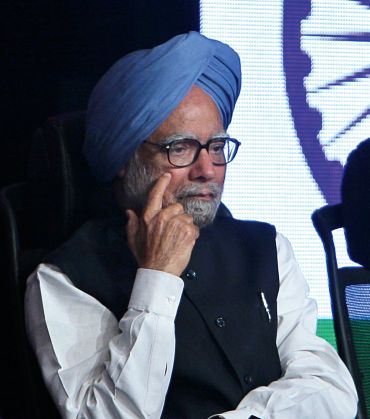
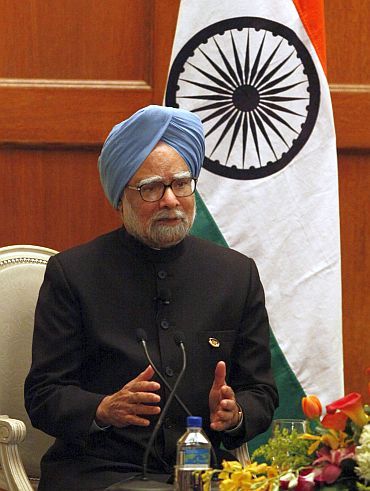
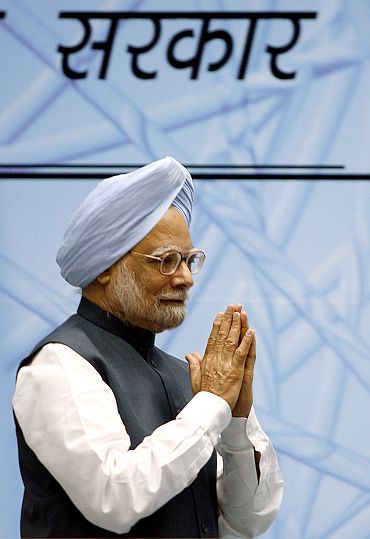
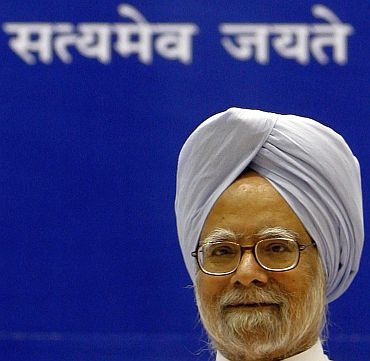
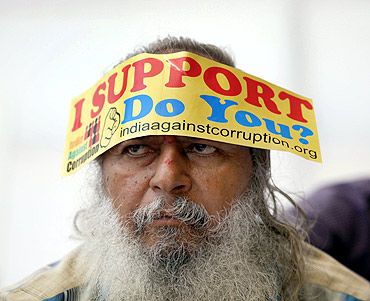
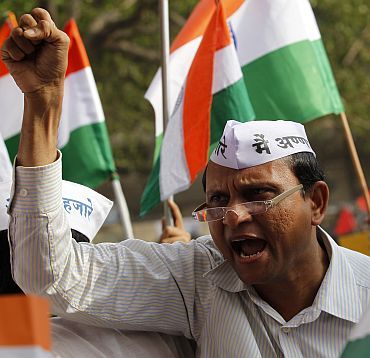
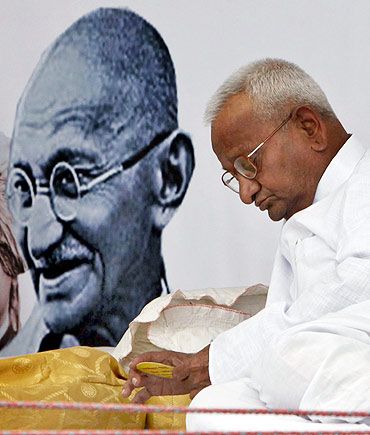
article